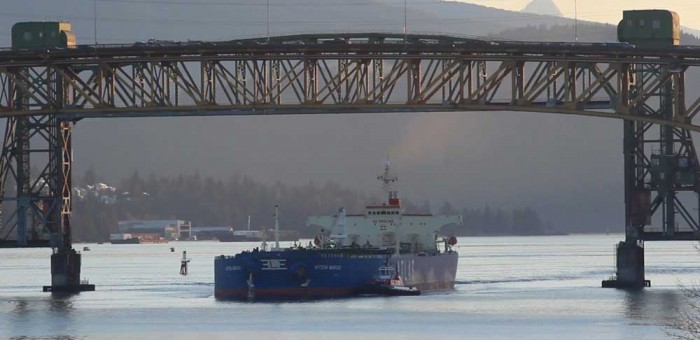Trans Mountain’s Oil Spill Economics
This post is part of an ongoing series in which MLA Andrew Weaver will be sharing key information from inside the National Energy Board hearings on Kinder Morgan’s Trans Mountain pipeline proposal. To see previous posts, please click here.
Trans Mountain’s Bold Claim
While reading through Kinder Morgan’s Trans Mountain pipeline application, my team was astonished to come across what has become one of the most talked about quotes from the entire 15,000 page application.
In discussing the impacts of oil spills, Trans Mountain tells us that “spills can have both positive and negative effects on local and regional economies.” Taking that point even further, they say that “spill response and clean-up creates business and employment opportunities for affected communities, regions, and clean-up service providers”
As you might predict, it didn’t take long for national and international news outlets to pick up on these quotes and for Trans Mountain to backtrack on their claims. According to them, the quote was taken out of context.
Given the serious and legitimate concerns we have about oil spills on our coast, I thought it was important to find out more about how Trans Mountain evaluated the potential economic impacts of a spill.
Requesting Trans Mountain’s Analysis
Now, let me first say that no economic benefits can justify the environmental catastrophe that a spill would cause. So many of our lifestyles, livelihoods and communities are based on the pristine coast we are so fortunate to have here in British Columbia. Not to mention the impact a spill would have on the environment itself, irrespective of our use of it. That is what makes Trans Mountain’s statement particularly troubling.
Yet, when it comes to this type of application, part of the process for weighing the costs and benefits of the pipeline also means analyzing the economic impact of a potential spill. Unfortunately, here’s what I found out from Trans Mountain:
In their entire 15,000 page application, Trans Mountain did not once adequately analyze the economic impact of a marine-based oil spill resulting from their project. Not only that, they told me they don’t need to do this. Here’s what they said:
“Economic cost-benefit analysis is an analytical tool sometimes used to inform whether a planned activity, policy or investment is beneficial to the economy and society. A spill is not a planned activity: it is an accident”. Therefore, “spills are not part of the economic benefits analysis undertaken for the project.”
If the economic impact of a spill is not analyzed in the application, then how can we know the true impact a spill would have on our local communities? And if we don’t know that, then how can we know the full extent of the risks we will be undertaking should this project be built?
A Look at the Research
Trans Mountain’s statement is based on what they say is a “growing body of literature” that “shows that both positive and adverse effects can occur” from a spill. So what does that literature say? According to one study:
“The McDowell Group (1990) report concludes that there are positive effects on spill-related business and certain business sectors such as hotels/motels, car/RV rentals, air taxi and boat charters offset negative effects on Vacation/Pleasure business.”
Most of these “positive effects” benefit businesses and sectors that help clean up a spill or that house temporary workers who would travel here to clean up a spill. Local economies, like our commercial fisheries or our tourism industry—an industry that thrives on the unique and unparalleled beauty of our natural surroundings—won’t be so lucky.
Not only that, but as it turns out, even this growing body of literature clearly demonstrates that the net overall effect of a spill is negative.
Of course, what Trans Mountain’s statements also ignore is the potentially catastrophic impacts a spill would have on the environment itself. There are few places in the world that offer as pristine a coastline and as beautiful an environment as we have here in British Columbia. To lose that to a spill would be simply devastating.
Trans Mountain’s failure to consider the full range of negative impacts that its pipeline could have on our local communities and on our environment reflects a mindset that is simply out of touch with the beliefs and values of countless British Columbians. It shows just how far Trans Mountain is from ever gaining the social license it needs to build its pipeline.





3 Comments
Loopholes are what make people dislike lawyers so much. This is sick. If you drill for oil, ALL you can do is hope for the best and prepare for the worst [PERIOD]. It’s a repulsive addiction that fuels 1st world countries while burying 3rd world countries. Renewable, clean energy is already chomping at the bit of big oil’s reins, so this “Beverly Hill Billy” fascination of striking it rich by selling Mother Nature out is dying quick.
I’m against the pipeline and I support raising awareness but I’m confused by what you’re saying here.
Details you’re looking for about the environmental risk: Would the full environmental risk and assessment typically be a part of the application, or would that be a seperately documented report/review?
The company that will be shipping the product by sea is the one responsible for marine spills. Is marine shipping part of TransMountain’s application, or is TransMountain just building a pioeline?
Hi Jodi, TransMountain prepared substantive submissions on the shipping aspect as part of the NEB hearing process.